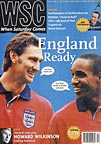 Shaul Adar covers the fallout over Eyal Berkovic's controversial autobiography
Shaul Adar covers the fallout over Eyal Berkovic's controversial autobiography
The furore over the excerpts from Eyal Berkovic’s book printed in the Mirror has not come as a surprise to anyone in Israel. Let’s be clear about one thing, however. Berkovic does not say in his autobiography,The Magician, that West Ham are racist. He does claims it is an unprofessional, unpleasant, ill-managed club in which nepotism plays an important role. One chapter is called “Frank Lampard Snr – West Ham’s biggest trouble”. He accuses the club of being xenophobic and says “they can’t stand foreigners” but he takes care not to call anybody a racist.
Presumably those words are enough to make Berkovic persona non grata at Upton Park, but one should keep in mind that even an honest translation can distort Berkovic’s intentions. In Israel, you see, politeness is considered to be bad manners. Like many Israelis abroad, Eyal thinks he know it all and loves to pass on his opinions. And he assumes that no one can understand Hebrew.
Alan Sugar might find it interesting to discover how Berkovic sat negotiating with Tottenham officials when he already had a signed contract from West Ham in his pocket. At one point he broke off the discussions to fake a phone call to his father, speaking in Hebrew to nobody. God knows why he had to put such a self-revealing story in his book, but he did.
He behaved the same way in the Upton Park dressing room. Once I saw him give grades, in Hebrew, to the rest of the team. Iain Dowie was deemed to be useless, John Hartson, curiously, came out quite well. Grading seems to be one of Eyal’s great passions. He writes about the abilities of his colleagues in the national team, at his old club in Israel and at Southampton. Usually his assessments are along the lines of “they’ve got talent, but haven’t got my character”.
You need a special character to write of a 17-year-old Israeli prodigy: “A player who turns down an invitation from Anderlecht is not the smartest guy in world football.”
Sometimes he can be very refreshing. Just before Israel played Spain in the final Euro 2000 qualifier he said on TV that “it’s not important. We will probably lose and still make the play-offs.” He was right, but the TV station, trying hopelessly to create a build-up to a dull game, went mad, as did the national coach (Spain won 3-0 and Israel will face Denmark in the play-offs).
Apart from his self-indulgence, Berkovic is also very petty. Every player, coach, manager or journalist who ever confronted him will find themselves in the book. Even an obscure school teacher from Haifa is mentioned. As a pupil Eyal used to tell her in class “one day you will be proud you were my teacher”. In the book he describes meeting her last year: “She was trying to be nice but I didn’t want to talk to her. I’m still angry at what she did to me.” John Barnes should bear it in mind.
From WSC 154 December 1999. What was happening this month